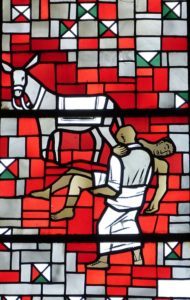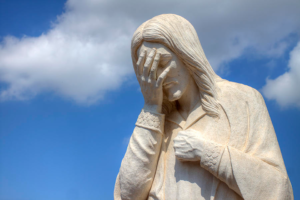Lori Stanley Roeleveld's Blog, page 24
October 17, 2018
The Problem with Peace
 Peace is a popular topic.
Peace is a popular topic.
I mean, you can see why, right? Peace is like the cool dude of virtues, which is why it became a hand signal in the sixties.
Peace is a place we can all agree, a platform on which we can all stand and applaud speech after speech made in its honor.
Peace is a cup we can pass around at our end-of-day campfire while we tell stories about how we all arrived.
So, I hesitate to mention this. It might lose me my seat at tonight’s bonfire (or make me the fuel), but there’s a serious problem with peace.
It’s easy to counterfeit.
And the counterfeit is virtually undetectable.
We know this because we know, love, work with, and study with all kinds of peaceful people who haven’t a care in the world even though they deny the existence of God.
Of course, there are some who are faking it until they make it, but I’m not talking about them. I’m talking about the ones who baffle us. The ones who are truly centered, grounded, focused, and whole. The people to whom we’re drawn because they have so much to offer. The ones who sometimes make us feel calm and we wonder how they do it without Jesus.
They’ve worked out a world view, a philosophy, a lifestyle on a very different matrix from ours and on this grid, they’ve located a quality they identify as peace, and so, they are peaceful. They explain to us that if we’d release our narrow view of the Jesus life, we too, could enjoy peace and be part of the process instead of the problem.
It sounds so beautiful and they build amazing campfires.
I was thinking about this when I was with two friends. One has an allergy attack. He’s miserable. His suffering is visible. Everyone can see he has a problem and he’s very uncomfortable and unhappy. But, allergy season will pass, and he will, again, enjoy health.
The other friend looks like the picture of health. He worked out this morning as he does every day. His diet is a model for others. He never misses work. He feels wonderful. He has cancer.

He will not recover from this cancer without enduring a long period of treatment that will make him extremely sick and uncomfortable.
Today, he is the picture of counterfeit peace. He looks fine, but he carries within him a death sentence that will detonate one day unless he is willing, now, to endure the discomfort of treatment. There is hope, of course, but only if he trusts the pronouncement of doctors who tell him he’s not fine despite how he feels.
Souls can enjoy a false peace this side of glory. It’s an amazing counterfeit because our enemy is an artist at reproduction. He cannot create, he can only copy. His work lacks depth and it doesn’t bear the mark of the Master.
We know the great Physician, who is the only One capable of knowing the true health of any soul.
That is our message – please be sure you’ve met with Jesus for a discussion about the state of your soul. Only He knows if you are truly centered for eternity or if, on a cellular level, your soul is set to self-destruct with a cancer that is only detectable by the Holy Spirit.
 When they see you suffering, struggling, and offer you their counterfeit peace, assure them that your struggle with pass. You are simply allergic to the things of this world. And you have chosen to receive the treatment that result in true peace – which you have now by faith, but one day will see face to face. It awaits you at a distant campfire, but Jesus has gone before you to light it and shines, even now, for all to see.
When they see you suffering, struggling, and offer you their counterfeit peace, assure them that your struggle with pass. You are simply allergic to the things of this world. And you have chosen to receive the treatment that result in true peace – which you have now by faith, but one day will see face to face. It awaits you at a distant campfire, but Jesus has gone before you to light it and shines, even now, for all to see.
Invite them into the discomfort that leads to genuine peace, and assure them, its worth the journey.
The problem with peace – yes, there’s a problem https://t.co/AzXqizhrzb #Jesus #Peace #peaceofmind #truepeace
— Lori Roeleveld (@lorisroeleveld) October 17, 2018
October 8, 2018
ACME Log-Removal Service VS. The Long Way
 Log-removal in my life is never a “one-and-done” proposition.
Log-removal in my life is never a “one-and-done” proposition.
Apparently, in my soul, there’s an entire redwood forest of old growth trees that my unsanctified self can split into logs the enemy uses to blind me to my own failings and prejudices at any time.
I have been guilty of subscribing to the ACME school of log-removal services by believing I can just skid up to an identified log, (beep-beep), push a button and kablooey! it’s
destroyed and no longer a concern. But some logs are apparently dispensed like tissues and as soon as I pull one from its spot, another pops up to take its place.
Christians must be relentless, tireless, and persistent in allowing God to identify and remove the logs from our eyes. Our message depends on it.
My brother called this week to let my husband know he has a log that needs removal. He felled an oak on his property and my husband is a woodworker who repurpose the wood. Removing this log will be a project. It will require work. The two of them will need others to assist. They’ll have to cooperate.
 That can also be true with logs we’ve grown accustomed to peeking around in our own eyes. Never has it been more vital for us to address these blinding impediments.
That can also be true with logs we’ve grown accustomed to peeking around in our own eyes. Never has it been more vital for us to address these blinding impediments.
Our country is divided. There are daily opportunities for us to have conversations about the big questions of life.
When does life begin? Who decides when it ends? How do we know who is telling the truth? How do we protect the vulnerable? How do we protect religious freedom and reconcile that with legislation some Bible believers see as immoral?
As intimidating and pitfall filled as it can appear, God has given believers an open door for deeper conversations with people who desperately need His light. Rather than clamming up, shuttering our windows, and turning on reruns of Andy Griffith until it all blows over, we must roll up our sleeves, remove our logs, and open our mouths to speak truth amid wide-spread deception.
Not long ago, I had two conversations with Christians who believe I am wrong about one important area of theology.
This is something I take seriously. I study God’s Word and sit under godly teaching. If I believe something, I believe I have it figured out. However, I’m not so arrogant as to think that when I see God face-to-face, He’s going to pat me on the back and tell me I’m one of the few who got every bit right. So, I listen when a brother or sister says I have it wrong.
However, I’m not so arrogant as to think that when I see God face-to-face, He’s going to pat me on the back and tell me I’m one of the few who got every bit right. So, I listen when a brother or sister says I have it wrong.
The two conversations though, couldn’t have been more different. The first person, a sister in Christ, approached me with a scowl. “I’m shocked that you’ve allowed yourself to be deceived around this area of doctrine. It makes me question your understanding of all of scripture!”
I felt fear, shame, confusion, and condemnation swirl up within me. “I’d love to understand more about where you’re coming from.”
She snapped her fingers. “Look in the Bible. That’s all I have to say. Look in the Bible and do what God says. If the Holy Spirit doesn’t convict you, well . . .” And she walked off.
Clearly, not only did she suspect I have a piece of doctrine wrong, my entire standing with Jesus was in question.
 That same day, I sat beside a brother in Christ I knew believed as that sister did. “Would you have a conversation with me about our difference in understanding on this piece of theology?”
That same day, I sat beside a brother in Christ I knew believed as that sister did. “Would you have a conversation with me about our difference in understanding on this piece of theology?”
“I will, indeed,” He replied. “Let’s start where we agree. I believe we are saved by grace through Jesus Christ and you do, too, yes? So, this is not a matter of salvation. Where ever we end up, we are family. And, I know you study God’s Word. You’re obviously not the only one who believes as you do, so I respect that you’re willing to listen to what I believe with openness. Now, I will take you through my understanding of what God’s Word says about this matter.”
And he did. He was patient with my questions. He listened as I explained my understanding of those passages. Our conversation ended with me having a deeper comprehension, much to consider going forward, and a sense of camaraderie between us.
I believe both individuals were acting from a place of love and valuing truth. If that sister didn’t care about me, she wouldn’t have spoken up at all. She may have been afraid of me and used that sharpness as an armor against however I may react. And God used her strong conviction to stir me to investigate further.
My brother, however, calmed the fear in me by starting on the solid ground of our agreement. It was easier for me to listen and be open when fear and shame were put in their place. I left that conversation feeling loved and informed.
and be open when fear and shame were put in their place. I left that conversation feeling loved and informed.
When we encounter people that disagree with us at home, work, school, church, or over social media, we need to remember to relentlessly submit to God’s process of removing our logs. Too often, peering through the redwoods in our own eyes, we only see part of what’s happening.
When we see hostility, condemnation, deception, and arrogance insisting on its own way, we sometimes miss that it is fueled by fear, wounds, and a grid-work of lies that have been taught as truth. Many people in our lives operate on a completely different matrix from us.
 Slow down the conversation whenever you can. Find the place of agreement even if it’s just that we are both humans who must share space on the planet and care deeply about how things are run. Ask God to remove your logs and help you see the opportunity your missing in the flood of accusations and anger. Then speak from a matrix of love, truth, and security in Christ – not fear or condemnation.
Slow down the conversation whenever you can. Find the place of agreement even if it’s just that we are both humans who must share space on the planet and care deeply about how things are run. Ask God to remove your logs and help you see the opportunity your missing in the flood of accusations and anger. Then speak from a matrix of love, truth, and security in Christ – not fear or condemnation.
Commit to the long-haul of obedience ever toward Christ. ACME log-removal makes for great cartoons, but not great conversations. We have the greatest opportunity right now. Let’s not watch it blow up in our faces.
ACME Log-Removal Service VS The Long Way https://t.co/4hFUtomIM8 How can Christians have #hardconversations in explosive times? #Jesus #amwriting
— Lori Roeleveld (@lorisroeleveld) October 8, 2018
October 3, 2018
The Most Powerful Ministry of Our Times
 We prepare for life’s major devastations – disappointment, divorce, disease, disaster, death.
We prepare for life’s major devastations – disappointment, divorce, disease, disaster, death.
We anticipate news of powerful men and women given over to corruption, robbers, rapists, thieves, liars, and murderers. All are antithetical to God, in opposition to His truth and yet their existence proves our need for Him.
Strange that we can almost endure these prime evils –nearly forge a path to sanity past these horrors because we brace for their existence and know their days will end.
It’s the personal cruelties that break our hearts. It’s intimate unkindness, cozy deception, bosom betrayals that wear us down and leave us longing for the end of days.
A caretaker ignoring the cries of a patient because she doesn’t feel like dealing with the mess during her shift.
A father who, angry with a wife who has left him, tells a little boy who adores him that the child’s a loser and he wishes the boy had never been born.
been born.
Young men who take advantage of desperate girls and then make public their indiscretions.
Women who perfect the art of speaking unkind words to other women, all the while smiling and pouring tea.
Young women who hand the “nerdy” boy a fake phone number, then mock them for thinking they had a chance.
A husband suggesting a wife is undesirable because of her size. A wife belittling her husband for the size of his paycheck. A grown child only showing up when they need just a small loan or wondering aloud what their inheritance might be.
An addict denying, despite a partner or parents’ evidence, that they’ve relapsed – feigning hurt and projecting failure on the faithful one.
Shepherds who hide behind trusting sheep when their congregation comes under fire.
 And playing out in the headlines of our times are a thousand evils compounded by the revelations of intimate cruelties. I’ve always been a fan of satire, but these days my television remains mostly off because I’m weary of the mocking where no one is safe – not children, not victims, not the innocent, not bystanders.
And playing out in the headlines of our times are a thousand evils compounded by the revelations of intimate cruelties. I’ve always been a fan of satire, but these days my television remains mostly off because I’m weary of the mocking where no one is safe – not children, not victims, not the innocent, not bystanders.
As if our country has chosen to languish forever in the lunch room of our combined junior highs and never rise above or mature past the phase when adolescents use unkindness and the lowest denominator to define their social construct.
If nothing else, it’s safe to say we must now all concede that the church doesn’t own a monopoly on self-righteousness. Apparently, it’s something to which many subscribe along with Netflix and Amazon Prime.
We live in days where almost everything can be obtained with the single computer click – everything, that is, but mercy. As if mercy has been discontinued along with rotary phones and analog clocks. No one is producing it any longer because the market disappeared and it’s only to be found in museums or occasionally at the Good Will.
How can we not believe the Bible now? “But understand this, that in the last days there will come times of difficulty. For people will be lovers of self, lovers of money, proud, arrogant, abusive, disobedient to their parents, ungrateful, unholy, heartless, unappeasable, slanderous, without self-control, brutal, not loving good, treacherous, reckless, swollen with conceit, lovers of pleasure rather than lovers of God, 5 having the appearance of godliness, but denying its power. Avoid such people.” 2 Timothy 3:1-5 ESV
lovers of self, lovers of money, proud, arrogant, abusive, disobedient to their parents, ungrateful, unholy, heartless, unappeasable, slanderous, without self-control, brutal, not loving good, treacherous, reckless, swollen with conceit, lovers of pleasure rather than lovers of God, 5 having the appearance of godliness, but denying its power. Avoid such people.” 2 Timothy 3:1-5 ESV
It’s time, perhaps, to replace the eagle as our national bird with the ostrich, for perhaps she is a more fitting representation of our majority: “The wings of the ostrich wave proudly, but are they the pinions and plumage of love? For she leaves her eggs to the earth and lets them be warmed on the ground, forgetting that a foot may crush them and that the wild beast may trample them. She deals cruelly with her young, as if they were not hers; though her labor be in vain, yet she has no fear, because God has made her forget wisdom and  given her no share in understanding. When she rouses herself to flee, she laughs at the horse and his rider. Job 39:13-18 ESV
given her no share in understanding. When she rouses herself to flee, she laughs at the horse and his rider. Job 39:13-18 ESV
The most powerful ministry of our times is to refuse to join the mockers and the scoffers, and to engage, instead, in the ministry of mercy.
It won’t win us friends. We’re going to look like fools. But, to be students of mercy is to follow Jesus’ command and to add to the light of these times, rather than the darkness.
“And as Jesus reclined at table in the house, behold, many tax collectors and sinners came and were reclining with Jesus and his disciples. And when the Pharisees saw this, they said to his disciples, “Why does your teacher eat with tax collectors and sinners?” But when he heard it, he said, “Those who are well have no need of a physician, but those who are sick. Go and learn what this means: ‘I desire mercy, and not sacrifice.’ For I came not to call the righteous, but sinners.” Matthew 9:10-13
We don’t need any greater platform for this ministry of mercy than our daily lives. By exercising mercy, we join the true resistance. We live as revolutionaries simply by exhibiting relentless kindness, mercy, forgiveness, and love in the face of cruel days.
resistance. We live as revolutionaries simply by exhibiting relentless kindness, mercy, forgiveness, and love in the face of cruel days.
Abandon self-righteousness – which is no righteousness at all – and let us steel our resolve to soften our hearts, to offer what we are not likely to receive in return – for this is the way of the cross.
When mercy goes missing, it isn’t truth that rules, but deception. Mercy and truth find their genesis in Christ. To compromise either is to aid and abet the enemy.
Reject cruelty in our conversations and refuse to pass judgement even on people who appear only on our television screens. Just as public figures have their secrets made public in the New York Times, so the ways we conduct our private lives will be made known either in this world or the next.
 Mercy matters.
Mercy matters.
It matters because our God is a God of relentless mercy and we represent Him on this outpost of glory.
Don’t allow the spirit of this age to erode your hope, or heart. Let us freely give what is promised us to receive – let mercy be found in us.
The Most Powerful Ministry of Our Times https://t.co/JPY7iSUtS3 that we can each do #Jesus #mercy #KavanaughHearings
— Lori Roeleveld (@lorisroeleveld) October 3, 2018
September 25, 2018
The Biggest Mistake of Our Times
 People are sometimes born into the wrong times. Has this happened to you?
People are sometimes born into the wrong times. Has this happened to you?
Maybe, you were meant to live during the frontier days – you know, when times were simpler. Men were men. Women were women. And hard work, community, and honest living were valued.
Or perhaps you were supposed to live the fifties on an endless loop when people respected tradition, knew their Bibles, and roles were clear.
Some of you, perhaps, were supposed to live at the dawn of American independence. Those were your times. When freedom really meant one was free, your home was your castle, and everyone bowed their heads for prayer.
Who can blame a person for growing weary of our times and imagining it means God made some cosmic error in assigning us to live here and now? We’ve all entertained at least a fleeting thought that we’re out of step with the age.
I, myself, am fascinated by the turn of the last century – the first half of the 1900s. It seems to me an exciting age and it produced writers whose voices influence me still – Tolkien, Lewis, Hemingway, Fitzgerald, Steinbeck, Jack London, Zane Grey, Langston Hughes. Powerful stories. Distinct styles. Themes that resonate with me in this modern day.
whose voices influence me still – Tolkien, Lewis, Hemingway, Fitzgerald, Steinbeck, Jack London, Zane Grey, Langston Hughes. Powerful stories. Distinct styles. Themes that resonate with me in this modern day.
But I was not born to live in those times.
God sent me here – now. And if you’re reading this in 2018, He destined you to share these days with me.
In Acts 17:26-27, Paul is quoted as saying: “And he made from one man every nation of mankind to live on all the face of the earth, having determined allotted periods and the boundaries of their dwelling place, that they should seek God, and perhaps feel their way toward him and find him. Yet he is actually not far from each one of us,”
God doesn’t make mistakes. We aren’t in the wrong time period – some of us simply refuse to accept our assignments.
You see, the simple fact is that if we live now, He designed us for now.
Not only that, but His Word says God has equipped us with everything we need for life and godliness, even in the age of Cosby, Trump, #metoo, North Korea, sarin gas, gender confusion, and growing persecution of the church.
 We have no excuse to waste the time we’ve been given imagining we belong to another age. We’ve received our assignment and our calling is to follow Jesus – as our unique selves – to be lights in these dark times.
We have no excuse to waste the time we’ve been given imagining we belong to another age. We’ve received our assignment and our calling is to follow Jesus – as our unique selves – to be lights in these dark times.
This isn’t a post to make us all feel good. In fact, I think we shouldn’t feel good if we waste the gift of this age wishing ourselves in another. It doesn’t feel like a gift sometimes, I know, but that’s our perspective – not the truth.
The moment we stop daydreaming and moaning, the moment we say, “Yes, these are my times and I know my Father designed me for now,” is the moment we should prepare to see God work in us and through us.
You have a purpose in these times. I know that because Jesus placed you here. We need you to be you – surrendered to Jesus – now.
All those voices that still speak to me reflected their times – but some reflected those times in the context of a relationship with Jesus – and those voices speak life. Life that informed not only their times but time into eternity. We can be those voices for our times – and beyond.
One of my favorite Tolkien quotes is this:
“‘I wish it need not have happened in my time,’ said Frodo.
‘So do I,’ said Gandalf, ‘and so do all who live to see such times. But that is not for them to decide. All we have to decide is what to do with the time that is given us.’” -The Fellowship of the Ring
I have an assignment for now – you need me to be faithful to it. I need you to be faithful to yours – even if we haven’t met.
These days are hard to navigate – impossible at times. I know. I’m here, too.
The good news is He created you and me to navigate hard, impossible times – in the name of Jesus Christ.
So, don’t make the biggest mistake of our times by spending them imagining you belong in another.
Act now. Live now. Love as only those designed for these times can love.
You and I were designed to love now – under duress, under pressure, under fire. We are designed to speak life into these days – life and light. To neglect our call is to aid the darkness.
days – life and light. To neglect our call is to aid the darkness.
Light the darkness of our times with your life. Now.
The Biggest Mistake of Our Times https://t.co/OxabYsGXV8 #Jesus #amwriting #amliving
— Lori Roeleveld (@lorisroeleveld) September 26, 2018
September 23, 2018
The Holiness of Worship that Bleeds into the Work Week
 Why does it have to be like this? You whimper as you sink into the chair, your face in your hands.
Why does it have to be like this? You whimper as you sink into the chair, your face in your hands.
Names of friends you could call flip through your mind like a contact list of lifelines but you can’t call – not again – you’d be telling the same old woes, asking the same old prayers, like a blinking neon sign no one cares enough to rewire – and sure, they’ll say some words and you’ll say it helped, but what will it change?
This world is so broken and so are you. Yes, of course, there’s beauty, life, new babies on the way, children to make you laugh and hope, glints of heaven that sometimes help you hold on but some days, like this day, they just hurt your eyes and remind you that you’re not home.
Hope feels more like a chain you drag around this damaged world and it would be such a relief to let it go. And where are you, Jesus? When will you come back for us? You see us hanging on – you see us keeping the faith through betrayals, diseases, debts,  divorces, lawsuits, and letdowns. One minute we’re singing your praise from the pew, the next we’re fielding lies from an addicted daughter, processing threats from a jealous sibling, or following the strobing lights of a rescue to the ER One. More. Time.
divorces, lawsuits, and letdowns. One minute we’re singing your praise from the pew, the next we’re fielding lies from an addicted daughter, processing threats from a jealous sibling, or following the strobing lights of a rescue to the ER One. More. Time.
And the brokenness isn’t just around you – it’s inside you – you can’t even pretend you’re superior to the others who cause you pain -because you see what horrors play across the IMAX of your mind – the greed, selfishness, lust, anxiety, arrogance, and doubt and when, when will you ever feel like you’re enough and when will the day arrive when faith is sight – will you be standing when that day arrives because your faith is depleted and your soul feels defeated despite the praise songs you sang today
Which you believed as the chords played but how quickly they fade along with everyone’s smiles as they return to their own homes you know are as imperfect as your own.
So Jesus! You cry into the palms of your hands – Jesus! Where are you now and what do I do with this bleeding mess that is my life until you return?
 And He is there because He hasn’t tarried in the empty sanctuary because the truth is you are His church – not that empty stained-glass room. And He doesn’t just love you and smile when you’re singing His praise – He is for you and with you with your face in your hands and the contents of your stomach rising.
And He is there because He hasn’t tarried in the empty sanctuary because the truth is you are His church – not that empty stained-glass room. And He doesn’t just love you and smile when you’re singing His praise – He is for you and with you with your face in your hands and the contents of your stomach rising.
He lived the mess. He lived the pain. He washed the feet of His betrayer. He pleaded with His best friends to stay awake, but He prayed alone as they slept. He heard His mother and brothers say they’d come to take Him home. And He took it on – all of it – the mess in your mind and in the hearts of everyone around you who will never get it right – He took it all on Himself.
Imagine the weight.
And He was broken, too. Broken for you. He didn’t do it for the beautiful choruses – He did it so He could be with you in the moments alone on your knees beating the floor and screaming into pillows when the agony of all that is wrong in this world threatens to steal your soul.
It can’t be stolen now because He has it sealed with Him – safe -until His return. Which is going to come.
And so, loved one, when the music fades and all is stripped away – worship is, after all, just about coming to Him – even if you’re writhing on your belly gasping for air just wishing we were all home and it was finally over.
your belly gasping for air just wishing we were all home and it was finally over.
You feel so alone but you are not. And it’s not just Him with you. There are others screaming, sobbing into their own hands. This desperate grasping for God is the worship that bleeds from our services into our workweek and we carry it with us like He bears the stripes on His back and the scars on His hands.
It comes from picking up our cross – not the shiny, golden necklace kind or the glittery, illuminated Christmas kind – but the splintering, back-crushing, heavy-laden cross that comes from loving God the Father and loving others and allowing ourselves to be broken by what breaks the heart of God.
One day, you know, we will rise with Him and it will be glorious, and we will be home. But we are not home yet, loved one.
Until then, it’s all right to let our worship bleed into our workweek for how else would we ever survive?
 And sometimes our sobs are the best song because we cry out to Him. And sometimes our pain is the best prayer because we let it bring us to Him. And sometimes the knowledge that we aren’t enough is the message we were meant to hear so we would bring our emptiness to Him and be filled.
And sometimes our sobs are the best song because we cry out to Him. And sometimes our pain is the best prayer because we let it bring us to Him. And sometimes the knowledge that we aren’t enough is the message we were meant to hear so we would bring our emptiness to Him and be filled.
He never tires of taking our call. He isn’t repelled by these private anguishes and moanings. And His desire is to lift us from despair and hold our hearts together until He comes to claim us again.
We invoke Him with our sighs and He speaks a benediction over our private pain – a benediction of hope, of promise, and of a willingness to bear this weight if we will only place it on Him.
For He knows what we are made of.
He’s a Good Father and we are loved by Him. Carry that with you and let it lead you to worship through the week until we gather again.
The Holiness of Worship that Bleeds into the Work Week https://t.co/qmpWZ8ZNve #Jesus #brokenness #Prayer
— Lori Roeleveld (@lorisroeleveld) September 23, 2018
September 19, 2018
One Bold Question I Dare You to Ask
 I spend a lot of time thinking about other people – thinking about them and praying for them.
I spend a lot of time thinking about other people – thinking about them and praying for them.
Doesn’t that sound lovely and spiritual? It’s not.
To be fair, I’m not completely unloving – to the credit of the work Jesus has done in my life these fifty-some years, but my soul is quite the long-term renovation project.
My friend, Jim Rubart, wrote a book called Rooms about a man who inherits a house that turns out to be a manifestation of his soul. I was thinking about that while sitting in the 120-year-old relentless money-pit renovation project we inhabit.
Good bones. That’s what people say when they take a tour. Great bones. Solid lines. Character. History. “Would they live here?” “Nooooo, no way,” they chuckle as they wave good-bye and head home to a place with no exposed walls and sound wiring.
Somewhere, my life took a turn and walked into a Rubart novel.
Like my home, I have some strong features and a sturdy foundation on which to build, but I’m a long way from livable. So,

while I spend a lot of time thinking about and praying for other people, much of that sounds like this:
“Lord, make her a better person. Easier to love. Less annoying.” “Father, help him see ways he could treat me kinder and be more generous with loving words.” “Jesus, bless them, please, and send a miracle their way so I don’t have to live any longer with the discomfort of thinking I should inconvenience myself and actually do something to alleviate their situation.”
Those aren’t the words I use, of course, because I’m not a complete fool, but believe me, when the translation comes through in glory, I’m not kidding anyone, but me.
So, during worship this weekend, Jesus decided to do some work in my heart. Our bold and fearless pastor preached a strong sermon on a challenging passage. Ephesians 5:21-6:9. Oh yeah, the submission passage, baby. He went for it because he’s a man who has his fears properly ordered – God first, everyone else second. He teaches through a book of the Bible without skipping the offensive bits.
As a preacher who rightly handles the Word of God, he emphasized the message of mutual submission in this passage and painted a thought-provoking image of what it would be like if God build a community in our midst of people who were committed to submitting to one another. I started thinking about people in the congregation who should really take that sermon to heart.
 That’s when Jesus interrupted my regularly scheduled programming with a news flash. “Daughter of mine, you have my permission to spend some time considering how this passage may apply to you.”
That’s when Jesus interrupted my regularly scheduled programming with a news flash. “Daughter of mine, you have my permission to spend some time considering how this passage may apply to you.”
What? Me? I’m the poster girl for submission! I work with others just fine. I certainly don’t demand to have everything my way. I mean, maybe in my younger days I struggled, but I not only live this passage, I teach it to others. What do I need to work on from this sermon?
And that’s when He hit me where I live and breathe – “Why don’t you ask someone close to you if there are ways you could improve at living this passage?”
Ahhh, I countered the Almighty. That’s a great idea! I think I’ll blog about that and suggest that we all begin to make a practice of asking those closest to us how we might improve at living the passage taught in church that morning. Great idea, God.
Ahem.
Okay. Fine. I guess I’ll – you know – try it first.
You’d think it would have been easy – this asking part. I really don’t think it’s a glaring problem area in my life, but I’m feeling stretched thin these days. Worn out. Pulled in a dozen directions and not very good at self-protection right now. Why let myself be even more vulnerable?
Right. I’ve been trying to rely on God for protection and not my own devices. Okay, fine. As I sat beside my husband on the porch, I tried to anticipate his answer, but finally decided just to – you know – obey God.
“Hey, honey?”
“Yes?”
“Pastor spent a long time teaching on that Ephesians passage this morning and it got me thinking.”
I noticed him tense up. “Yeah?”
“Are there ways you think I could do a better job at living that passage?”
He stopped rocking and looked at me like I might be having some sort of episode. He wrinkled his eyebrows, but then he smiled. “No, actually. You do a great job in that area. Why do you ask?”
“Just trying to stay open,” I replied as I exhaled.
It’s funny how terrifying it was to open myself up to that, but it was a powerful experience to ask that question. It reminded me how vulnerable we all are to one another. It made me reflect on how hard I try and how much I hoped for mercy from Rob in answering. And it was a cautionary wake-up call to how easy it is to slip into the habit of outsourcing the application of scripture to how everyone else ought to be doing it.
I think, if I can continue to exercise bravery, I’m going to make a habit of this question.
How about you? Are you brave enough to turn to the people closest to you after worshiping this weekend and ask, “Are  there ways you think I could do a better job of living that Bible passage?”
there ways you think I could do a better job of living that Bible passage?”
How would it change the lunchtime conversation if we opened with that? How might it change our characters, families, congregations, communities, the world?
At the very least, it puts a cramp in the time I spend assessing other people’s lives and considering ways to hint that they should be applying this week’s sermon. That alone should improve the community in my corner of the world. How about you?
One Bold Question I Dare You to Ask https://t.co/7YsYnoYP0Y #Jesus #amwriting #Church
— Lori Roeleveld (@lorisroeleveld) September 19, 2018
September 13, 2018
When Christians Who Sin are Exposed to the World
 There comes a time in everyone’s life when it’s important to grow up, to step into maturity, to move past childish things. It is that time in the life of the modern church.
There comes a time in everyone’s life when it’s important to grow up, to step into maturity, to move past childish things. It is that time in the life of the modern church.
Specifically, we need to grow up around the topic of sin within the Body of Christ.
The church is making headlines because of individuals and systems that engage in sin, conceal and protect people who commit habitual sin, and people who perpetuate sinful acts under the guise of holiness.
Priests who engage in sexual abuse. Christian leaders, teachers, and speakers who abuse their power to engage in consensual sexual impropriety or outright predatory and harassing behavior. Adultery, pornography, rape, embezzlement, fornication, fraud, deception, and greed have no place in the Body of Christ and yet, there they are. Add hypocrisy to the list.
impropriety or outright predatory and harassing behavior. Adultery, pornography, rape, embezzlement, fornication, fraud, deception, and greed have no place in the Body of Christ and yet, there they are. Add hypocrisy to the list.
Let’s speak, however, like grown-ups when these sins come to light.
First of all, let shock be only a momentary reaction, not a resting place. If sin could be destroyed by church attendance, being raised in a believing home, writing and reading Christian novels, or preaching a thousand moving sermons, then Jesus would not have had to die.
Sin is insidious. Even after we come to Christ, there is a process of maturing, of growing in faith, of increasing in the fruits of the Spirit, of inhabiting our freedom that takes time and isn’t always a straight walk forward. We stumble into potholes of sin along the way. We have an active enemy who sets snares.
If the church could grow up and make a safer, more realistic space to have these conversations shortly after sin is  conceived in our minds, it would go a long way toward preventing systemic cover-ups. Seriously, denomination-wide cover-ups don’t emerge overnight! Numbers of individuals make multiple sinful, selfish decisions for something to reach that level. Let’s agree to search for the exit ramp earlier in the process!
conceived in our minds, it would go a long way toward preventing systemic cover-ups. Seriously, denomination-wide cover-ups don’t emerge overnight! Numbers of individuals make multiple sinful, selfish decisions for something to reach that level. Let’s agree to search for the exit ramp earlier in the process!
If you’re a Christian, develop relationships with two or three other mature believers who you’re free to call and confess sin.
Say – “Hey, I have to confess I’ve been unhappy in my marriage lately and I’ve started daydreaming about a coworker.” Or “I want to talk about the fact that I’ve started use bigger wine glasses and am drinking earlier in the afternoon. I think I’m heading to an unsafe place with alcohol.” Or “I’ve been fooling myself lately about pornography and have to confess I’ve been indulging in it after everyone goes to sleep at night. What are some ways I can get help with accountability?” “Or, I’m starting to enjoy the attention of one of the women in my writing class a little too much. I need your support to send her clear communication that our flirtation has to end.”

James 5:16 ESV says, “Therefore, confess your sins to one another and pray for one another, that you may be healed. The prayer of a righteous person has great power as it is working.” Confess, pray, and have follow-up conversations. Discuss what action the other person will take if they suspect you’re continuing in sin. Of course, we’re saved by grace, but our testimony is tarnished by habitual sin, so we must take it seriously as early as we perceive it.
It’s wonderful when the church prays for physical healing, but we must not neglect prayers for healing and repentance from sin. Create opportunities for this in the culture of your congregational life.
Second, we need to become comfortable with discussing the truth that not everyone who says they follow Jesus actually follows Jesus.
1 John 3:10 ESV says, “By this it is evident who are the children of God, and who are the children of the devil: whoever does not practice righteousness is not of God, nor is the one who does not love his brother.”
Besides the spiritually immature and those who have lapsed into sin, within the context of the visible church there are  posers and pretenders – some have even managed to deceive themselves. With this understanding, we can view the moment of exposed sin as an opportunity to discuss what it means to truly follow Jesus and the importance of not presuming on the grace that was purchased at such great cost. The revelation of undisclosed sin is an opportunity to truly embrace the gospel.
posers and pretenders – some have even managed to deceive themselves. With this understanding, we can view the moment of exposed sin as an opportunity to discuss what it means to truly follow Jesus and the importance of not presuming on the grace that was purchased at such great cost. The revelation of undisclosed sin is an opportunity to truly embrace the gospel.
While it’s way above our pay grade to make determinations about an individual’s state of salvation, it’s important to be unwaveringly clear that entering a relationship with Jesus should be reflected by a changed life – not a perfect one, but one that is moving in the direction of ever-decreasing forays into sin. Create a culture in your congregation where spiritual growth and maturity are expected and where people do serious work together to encourage it to happen.
Third, see something – say something – to the brother or sister before you – gently and with all humility.
Galatians 6:1-2 ESV says, “Brothers, if anyone is caught in any transgression, you who are spiritual should restore him in a spirit of gentleness. Keep watch on yourself, lest you too be tempted. Bear one another’s burdens, and so fulfill the law of Christ.”
I am forever grateful for mature brothers and sisters along the way who have spoken frankly with me when they saw sin in my life. Never comfortable. Always painful. And yet, the roadblocks of Christ-loving siblings standing between me and the path of destruction have saved me multiple times from shipwrecking my soul. I respect those who found courage to speak up and viewed their confrontations as acts of love.
comfortable. Always painful. And yet, the roadblocks of Christ-loving siblings standing between me and the path of destruction have saved me multiple times from shipwrecking my soul. I respect those who found courage to speak up and viewed their confrontations as acts of love.
Finally, we never speak of these situations as those who live without hope. We inhabit the reality of redemption. In love, we hold out hope for all.
We do not live in a world of monsters, deplorables, or those who can never be forgiven, but in a world where no one is righteous – no, not one – but all are eligible for the forgiveness and grace provided solely through the crucifixion and resurrection of Jesus Christ.
1 John 2:1-2 ESV says, “My little children, I am writing these things to you so that you may not sin. But if anyone does sin, we have an advocate with the Father, Jesus Christ the righteous. He is the propitiation for our sins, and not for ours only but also for the sins of the whole world.”
 We don’t make a display of condemnation nor do we hashtag judgment before a dark world that cannot comprehend light. Some of these sinners are brothers and sisters, who may be rightly suffering public correction because of their positions, but also deserve our love and allegiance as the family of God. We hold out hope for their restoration and do not imagine ourselves as superior to them in any way. How we treat family who fall into sin is as much a part of our testimony of love as anything else we do.
We don’t make a display of condemnation nor do we hashtag judgment before a dark world that cannot comprehend light. Some of these sinners are brothers and sisters, who may be rightly suffering public correction because of their positions, but also deserve our love and allegiance as the family of God. We hold out hope for their restoration and do not imagine ourselves as superior to them in any way. How we treat family who fall into sin is as much a part of our testimony of love as anything else we do.
I’ve gone on too long with this post, but rightly handling public exposure of sin within the church is an important topic to discuss, pray over, and get right in these days of social media and global communication. I’m sure you have thoughts that may differ from mine – I’d love to hear them!
When Christians Who Sin Are Exposed to the World https://t.co/wT7CbIAHPj #Jesus #amwriting #churchfail
— Lori Roeleveld (@lorisroeleveld) September 13, 2018
September 7, 2018
The Funny Thing about Humility
 The funny thing about humility and arrogance is that they can masquerade as each other.
The funny thing about humility and arrogance is that they can masquerade as each other.
When I made my first serious venture into writing, I entered my unpublished novel in a writing contest but didn’t even make the finals.
I arrived at the writing conference where the winner would be announced worried that the trip would be ruined if I gave into envy for those who did final. I asked God to show me the way through jealousy.
Shortly after I arrived, I met another conferee and we hit it off immediately. On the shuttle to the hotel, someone identified her as a finalist. I felt a pang but turned it over to Jesus. She and I ran into each other at every turn and became fast friends. God whispered the truth to me, that she would win the prize I had sought.
When her name was announced, I was beside her. After she claimed her publishing deal and her large check, she returned to her seat. I whispered, “Your life just changed. Don’t you want to call your parents and let them know?” Sitting alone again, I felt genuinely happy for her. I’d grown to care about her and God showed me that love is one pathway through envy.
As other winners were announced though, I felt passed over, over-looked, set aside. My thoughts sounded like humility to me, “I guess I’m not good enough, that’s all. Prizes aren’t in my future. I should stop aiming so high and just focus on God.”
to me, “I guess I’m not good enough, that’s all. Prizes aren’t in my future. I should stop aiming so high and just focus on God.”
As I indulged in self-pity, I asked God for comfort. At that moment, my new friend returned to her seat and whispered, “My parents were so excited! And I told them that God was so kind to me, He even arranged for me to meet a nice older lady to celebrate the moment with me!”
I remember turning to God (in my mind) and asking, “Seriously? That’s my comfort! Not only am I a loser, but I’m also OLD?”
But, He revealed the truth to me. I didn’t need comfort, I needed humility. I wasn’t being overlooked, I was being schooled. The loss didn’t make me a loser, my attitude did. Far from being humble and unseen, my arrogance and sense of entitlement threw a glaring spotlight on me that could be seen from the throne of Heaven.
God showed me by that loss that I had a lot to learn and I didn’t like that. I wanted an easy victory. I felt entitled to it because He was my  Father. But, here I was in a room full of His children all with the same desire.
Father. But, here I was in a room full of His children all with the same desire.
Right there, I humbled myself before Him and asked Him to make me a good student – of writing and of Jesus. He gave me the gift of writing and I knew better (because of His Word) than to bury it in the ground.
Fast forward a few years and a few hundred rejections that continued to whittle away at arrogance, as I learned. My lessons weren’t only in writing, though, but also in humility and warfare.
One strategy God gave me against discouragement was to visit a local Christian bookstore and stand dead center. As I looked around at the stacks and stacks of books, I would say to myself, “If all these people made it to this place, there’s no reason you can’t, too. They had doubts. They had lessons to learn. They worship the same mighty God. He saw them, and He sees you. If they made it, why can’t you?”
You see, along this writing journey, I learned it’s not at all about me. This work, this ministry, is and always was about Jesus.
There’s nothing special about me that didn’t come from Him. There’s nothing I write or know that doesn’t find its origin in who He is. What looks now like self-confidence is not that at all. It’s God-confidence. It’s the security of having Him fully in my sight and knowing He sees me. In the corridor of His gaze, I know all things are possible, not just for me, but for any of us who follow Jesus.
He is. What looks now like self-confidence is not that at all. It’s God-confidence. It’s the security of having Him fully in my sight and knowing He sees me. In the corridor of His gaze, I know all things are possible, not just for me, but for any of us who follow Jesus.
The gospel writer, Luke, tells a short story about a woman who had grown accustomed to being overlooked. She’d had a discharge of blood for twelve years, which in Israel would have been a very public, private problem that rendered her continually unclean. No one had been able to heal her.
As the crowd pressed in around Jesus, this woman came up behind Him and touched the fringe of His garment. She was healed instantly. But, Jesus is never satisfied with partial healing – He wants us completely healed.
He stopped walking and turned to the crowd – “Who was it that touched me?”
Luke says that everyone denied it.
 Peter tried to return Him to His task saying, “Master, the crowds surround you and are pressing in on you!” But Jesus said, “Someone touched me, for I perceive that power has gone out from me.”
Peter tried to return Him to His task saying, “Master, the crowds surround you and are pressing in on you!” But Jesus said, “Someone touched me, for I perceive that power has gone out from me.”
I love how Luke describes what happened then. “And when the woman saw that she was not hidden, she came trembling, and falling down before him declared in the presence of all the people why she had touched him, and how she had been immediately healed.”
And when the woman saw that she was not hidden – what a powerful phrase.
You see, pretending God doesn’t see us is a way of indulging in self-pity. It’s a kind of arrogance we embrace to excuse our inaction.
When she accepted that she actually was seen – known by the God of the Universe, she testified to what His power had done in her. This, I believe, is the act of faith that Jesus says healed her completely – the faith that her testimony mattered even though  everyone in the crowd might have silenced her. Jesus called her out and she spoke the truth at His call.
everyone in the crowd might have silenced her. Jesus called her out and she spoke the truth at His call.
For that moment, she had to let go of herself and think only of Him. And that is the foundation of humility, loved ones.
And humility leads to God-confidence that frees us to live and speak the truth even when the crowd presses in.
The Funny Thing about Humility https://t.co/eNKDYJZX0S moving past arrogance to freedom #Jesus #amwriting
— Lori Roeleveld (@lorisroeleveld) September 7, 2018
September 1, 2018
The Dangerous Idol You May Accidentally Be Worshiping

Sometimes I wonder why God doesn’t just neatly bubble-wrap His followers. Have you asked that question? (Okay, maybe not that question, but something like it.)
Idols are sly and slippery things that surreptitiously supplant our Savior from His station in our soul’s sight. If we aren’t watchful, we can find ourselves in a dark place because we mistakenly followed a usurper when our eyes were not on Him.
In our times, personal safety can become an insidious idol.
Safety concerns are wise, of course, to a point, but when they rise to the level of anxiety, when they take priority over service and calling, when they rob us of sleep and consume prayer time that might be better invested in eternal concerns, it’s time to open ourselves to a hard conversation with God about His place in our priorities.
I’m tempted to serve at the altar of safety myself, even more so for my loved ones than for me. When it becomes my most frequent, fervent  prayer for others, it’s a sign to me that safety is climbing the charts of my minds’ top 40 and I need to take stock and help it descend before it unseats Jesus from His place at number 1.
prayer for others, it’s a sign to me that safety is climbing the charts of my minds’ top 40 and I need to take stock and help it descend before it unseats Jesus from His place at number 1.
It’s natural that we consider our safety. Life is a precious gift from our loving Father. Of course, we value it, so why ever risk our safety?
We’re allotted one life on this planet. One. And that one is over in the length of a dash on a headstone. Isn’t preserving life as long as possible the ultimate goal? Shouldn’t protecting ourselves from harm be our primary pursuit – all the better and longer to be about the work of the kingdom?
This is the thinking that causes people to question the decisions some Christians make of leaving the relative safety of life in the West to pursue work in more dangerous places of the world.
There are Christians risking Ebola to care for victims of the deadly disease in Jesus’ name. Others relocate to inner cities to care for the urban poor or to desperate and volatile locations like Haiti, Somalia, or Afghanistan to bring the good news of Christ to places of endless danger and need. Still others risk travel to countries openly hostile to Christ to deliver Bibles and  encouragement to persecuted Christians.
encouragement to persecuted Christians.
With all the good there is to do in the world that won’t put our lives at risk, shouldn’t we just focus on that?
NO.
Why?
Because, there are conditions less favorable than death.
To believe that is one thing. To act on that belief requires great faith and an appreciation of the afterlife, of eternity, of a future sealed up with Jesus Christ.

That faith is hard enough to find (except when it’s a gift from God). But worse, Satan distorts this truth by perverting belief in the afterlife, twisting it into warped, uninformed, deceptive knock-offs of faith and inserting them into the world through false teachers and cults.
Because of this, devoted, Christ-like individuals who place service to Christ above personal safety are sometimes lumped in with Kool-Aid drinking dupes and bomb-laden, virgin-populated-Paradise seeking misguided terrorists.
It’s not hard, however, for reasonable people to distinguish between the truth and the life.
First, Christian martyrs (those whose lives are lost in service to Christ) don’t determine to take others down with them. We lay down our lives, we don’t turn ourselves into flesh-and-blood bomb delivery systems in Jesus’ name.
Second, Christians don’t seek glory through martyrdom, we seek glory in Jesus Christ and that sometimes leads to martyrdom. A crucial distinctive of our faith.
 Christians love life. Life is a gift from God. Precious. Worthy of protection. We hate death and do not seek it. However, we do not love our lives so much as to shrink from death if it crosses the path of our love for and obedience to Jesus Christ.
Christians love life. Life is a gift from God. Precious. Worthy of protection. We hate death and do not seek it. However, we do not love our lives so much as to shrink from death if it crosses the path of our love for and obedience to Jesus Christ.
There are places on this planet where it is downright dangerous to believe in Jesus Christ – some Christians are born there and others are called to relocate there. In all cases, it’s better to pursue Jesus than safety.
Allow me to encourage all of us who love the Lord (we hobbits, we disciples, we who are loved by God): If God calls us to serve from the Shire, from home, from a place of safety, then we should do so with zealous joy. If God calls us to serve in a place of obvious danger, we should go forward in faith, obedient to His Word and strengthened by His Spirit, with the prayers of the saints our shield wall.
Remember that there are conditions less favorable than death – disobedience, cowardice, indifference to suffering, loveless, faithless, rebellious, in bondage to self and sin. To be without Christ and alive to this world is less desirable than to be alive to Christ and facing death to this life.
Christians who follow Jesus into harm’s way have renounced the worship of personal safety as idolatry. They are no fools or if they are,  they are God’s fools in the same way that Jesus’ death on the cross was foolishness to those who are perishing from all eternal hope.
they are God’s fools in the same way that Jesus’ death on the cross was foolishness to those who are perishing from all eternal hope.
Don’t seek martyrdom. Seek Jesus. Always seek Jesus. Still, know that death in the line of following Jesus is preferable to eternal death of the soul.
If your call is into dangerous territory, don’t expect the world to understand and don’t wait for their approval or applause. It’s not coming. We’re not home yet, but when we are, you’ll receive your reward.
Jim Elliot, who was martyred by the very people to whom He was sent, once said this: “When it comes time to die, make sure that all you have to do is die.” A person who has said yes to Jesus Christ is prepared to die because, for them, death is only a door into the next part of the adventure. Valuing anything ahead of Jesus Christ, even safety, is idolatry and we need to renounce all idolatry, claiming our freedom in Christ.
 Death isn’t glorious. Martyrdom isn’t glorious. Eternal life with Jesus is glorious and we entered into that the moment we entered into relationship with Jesus.
Death isn’t glorious. Martyrdom isn’t glorious. Eternal life with Jesus is glorious and we entered into that the moment we entered into relationship with Jesus.
So we are content if Jesus blesses us with a long life on earth so that we die peacefully in our sleep and we accept, with grace, if Jesus calls us to die in the line of serving Him because we trust Him with our lives and worship Him above all.
Each of us needs to understand this truth no matter where we serve the Lord at present because one day, danger may even invade the safe Shire. When it does, Jesus will make us ready for it, loved ones, and He will equip us to stand so we’ve no cause for worry or for fear.
To pursue death for the sake of religious glory, this is foolish.
But he or she is no fool who forsakes the idol of safety to pursue Jesus Christ. And let our prayers for our loved ones focus more on their ever-deepening love of God and knowledge of Him than on their safety in this life for there is much, much more life to come.
focus more on their ever-deepening love of God and knowledge of Him than on their safety in this life for there is much, much more life to come.
The Dangerous Idol You May Accidentally Be Worshiping https://t.co/iflYASBBq6 #Jesus #hardconversations #amwriting
— Lori Roeleveld (@lorisroeleveld) September 1, 2018
August 26, 2018
Why I’ve Given Up on Open Doors
 There are many doors in the Bible, but God concerns Himself, primarily, with two.
There are many doors in the Bible, but God concerns Himself, primarily, with two.
The first, he mentions to Cain in Genesis 4:7: “If you do well, will you not be accepted? And if you do not do well, sin is crouching at the door. Its desire is contrary to you, but you must rule over it.”
This is the door within us. This door we all have, and some keep locked to God. We must open the door within us to Christ because when we do, we enter into a reality more powerful than any the world has ever known.
more powerful than any the world has ever known.
Abraham sat at the door of his tent and this is where he encountered God in Genesis 18. When God promised Abraham a son, Sarah listened by the door and when she heard the pronouncement, she laughed to herself, there in the doorway.
When the angels God sent to deliver Lot from the destruction of Sodom and Gomorrah were threatened with harm by the men of that city, Lot shoved them into his home and closed the door behind him. The angels reached out and pulled Lot in. Then, they blinded the Sodomites, so they could not find the door.
When the angel of death was due in Egypt, Moses instructed the Israelites to put the blood of a sacrificial lamb above their doorposts as a sign that the angel should pass them over (Exodus 12). Then, in the wilderness, every morning when Moses would depart his tent to enter the of meeting, every Israelite would gather at his or her door and worship.
When God gave His commands to Moses, He commanded that all the people write them on their doorposts.
 When King David had sinned with Bathsheba and called her husband, Uriah, in from battle, hoping one night with his wife would cover David’s sin, Uriah refused to enjoy the comfort of his wife. He chose, instead, to sleep at David’s door. (2 Samuel 11:9)
When King David had sinned with Bathsheba and called her husband, Uriah, in from battle, hoping one night with his wife would cover David’s sin, Uriah refused to enjoy the comfort of his wife. He chose, instead, to sleep at David’s door. (2 Samuel 11:9)
In 2 Kings 4, we see Elisha performing miracles behind closed doors, shutting out the unbelief of those on the other side.
This first door is our door. Jesus mentions it in Revelation 3:20 “Behold, I stand at the door and knock. If anyone hears my voice and opens the door, I will come in to him and eat with him, and he with me.”
If you have yet to open the door of your heart to Jesus, I strongly urge you to do that now. To live with the door of your heart open to Him is to truly live. Shutting Him out leads only to death.
You already know the second door. The only other door that matters. It’s Jesus.

In John 10:9, Jesus says, “I am the door. If anyone enters by me, he will be saved and will go in and out and find pasture.”
We know that Jesus doesn’t need doors opened for Him – He is the door.
After His resurrection, Jesus’ followers were praying in the upper room with the doors locked in fear for their safety. He entered without issue. When Peter was imprisoned, Jesus opened the doors of Peter’s cell. In Acts 12, when Peter and the angel reached the iron gate of the city it “opened for them of its own accord.”
Jesus tells the church of Philadelphia, “The words of the holy one, the true one, who has the key of David, who opens and no one will shut, who shuts and no one opens. ‘I know your works. Behold, I have set before you an open door, which no one is able to shut. I know that you  have but little power, and yet you have kept my word and have not denied my name.’” (Revelation 3:7-8)
have but little power, and yet you have kept my word and have not denied my name.’” (Revelation 3:7-8)
Why am I thinking today about open doors? Because I realized this week, I have to stop looking for them.
I’ve wasted too much time in my fifty-seven years, looking for open doors to walk through. What a fool! Walking through open doors is something anyone can do – it doesn’t require the power of Jesus to walk through an open door.
I don’t need open doors. What I need – what we need – is to keep the doors of our hearts opened to Jesus and then walk with Him through the door of every situation to which He leads us. He is the open door.
Remember Harold and the Purple Crayon? Little Harold didn’t worry about doors or bridges or parachutes – when he needed a door, He drew one with his purple crayon and stepped through.
drew one with his purple crayon and stepped through.
The power of Jesus Christ is like that, except it’s real – more real than any slammed door, locked door, impenetrable door, barred or chained door between us and where Jesus wants us to go.
Are you standing before a closed door? Stop waiting for it to open.
Ask Jesus to show you the way through and then walk in the way He shows. We don’t need open doors – we abide in the door. Just keep walking.
Why I’ve Given Up on Open Doors (and so should you!) https://t.co/jfsaf5EkMF #Jesus #Jesusisthedoor #haroldandthepurplecrayon
— Lori Roeleveld (@lorisroeleveld) August 26, 2018



